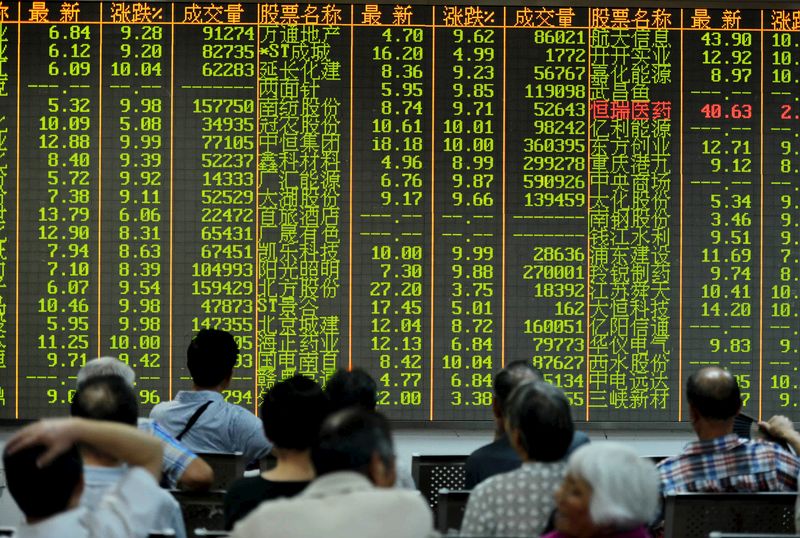* MSCI Asia ex-Japan index down 0.3 pct, Nikkei rebounds 0.6 pct
* China's CSI300 down 0.2 pct in choppy trade
* Tariffs on $34bn of Chinese goods take effect at 0401 GMT
By Andrew Galbraith
SHANGHAI, July 6 (Reuters) - Faltering Chinese markets dented Asian stocks in a choppy Friday morning, just hours before Washington is set to impose tariffs on Chinese imports that many investors fear might trigger a full-scale trade war in a blow to the global economy.
Around 0215 GMT, MSCI's broadest index of Asia-Pacific shares outside Japan .MIAPJ0000PUS was 0.3 percent lower, pulling back from a modest early rise. The index has lost 8.8 percent since June 7.
Seoul's Kospi index .KS11 fell 0.2 percent and shares in Taiwan .TWII were 0.4 percent lower. Australian shares .AXJO were up 0.4 percent.
China's major indexes were choppy in early trade, with the blue-chip CSI300 index .CSI300 in and out of negative territory. It was last 0.2 percent lower, while the Shanghai Composite index .SSEC fell 0.3 percent.
Japan's Nikkei stock index .N225 was 0.7 percent higher after closing at a three-month low on Thursday.
U.S. and European shares had been boosted on Thursday by reassuring economic data from Germany, and as automakers' shares .SXAP jumped, with German Chancellor Angela Merkel saying she would back lowering European Union tariffs on U.S. car imports after Washington offered to scrap threatened tariffs on European cars. backdrop of easing tensions helped the Nikkei's broad rebound, with automaker Honda Motor Co 7267.T jumping 2 percent and Toyota Motor Corp 7203.T rising 1.9 percent.
But in early trade on Friday, the focus remained on U.S. tariffs.
On Thursday, U.S. President Donald Trump confirmed that the United States would begin collecting tariffs on $34 billion worth of Chinese imports at 12:01 a.m. Washington time (0401 GMT) on Friday, and warned that subsequent rounds could see tariffs imposed on more than $500 billion worth of goods. risk that further escalation derails growth is keeping some investors cautious," ANZ analysts said in a note Friday.
The Sino-U.S. trade dispute has roiled financial markets including stocks, currencies and the global trade of commodities from soybeans to coal over the past several weeks.
Newly released minutes from the U.S. Federal Reserve's last policy meeting on June 12-13 showed policymakers discussed whether recession lurked around the corner, and expressed concerns global trade tensions could hit an economy that by most measures looked strong. yield on benchmark 10-year Treasury notes US10YT=RR was at 2.8364 percent, compared with a U.S. close of 2.84 percent.
The two-year yield US2YT=RR , which rises with traders' expectations of higher Fed fund rates, was at 2.5527 percent compared with a U.S. close of 2.561 percent.
Gold, which is sensitive to rising interest rates, was 0.2 percent lower. Spot gold XAU= traded at $1254.43 per ounce. GOL/
The dollar was up 0.1 percent against the yen at 110.72 JPY= .
The single currency EUR= was down a hair on the day at $1.1682, while the dollar index .DXY , which tracks the greenback against a basket of six major rivals, was flat at 94.474.
After ticking slightly higher, oil prices fell after U.S. government data showed an unexpected jump in crude oil stockpiles. the market remains nervous on concerns over tariffs amid an increasingly tight oil market.
Tensions between the U.S. and Iran continued to rise as the U.S. Navy said it stood ready to ensure free navigation and the flow of commerce, after Iran's Revolutionary Guards threatened to block oil shipments through the Strait of Hormuz. crude CLc1 fell 0.2 percent at $72.80 a barrel. Brent crude LCOc1 was 0.4 percent lower at $77.08 per barrel.
<^^^^^^^^^^^^^^^^^^^^^^^^^^^^^^^^^^^^^^^^^^^^^^^^^^^^^^^^^^^ MSCI, Nikkei datastream chart
http://reut.rs/2sSBRiD
^^^^^^^^^^^^^^^^^^^^^^^^^^^^^^^^^^^^^^^^^^^^^^^^^^^^^^^^^^^>
